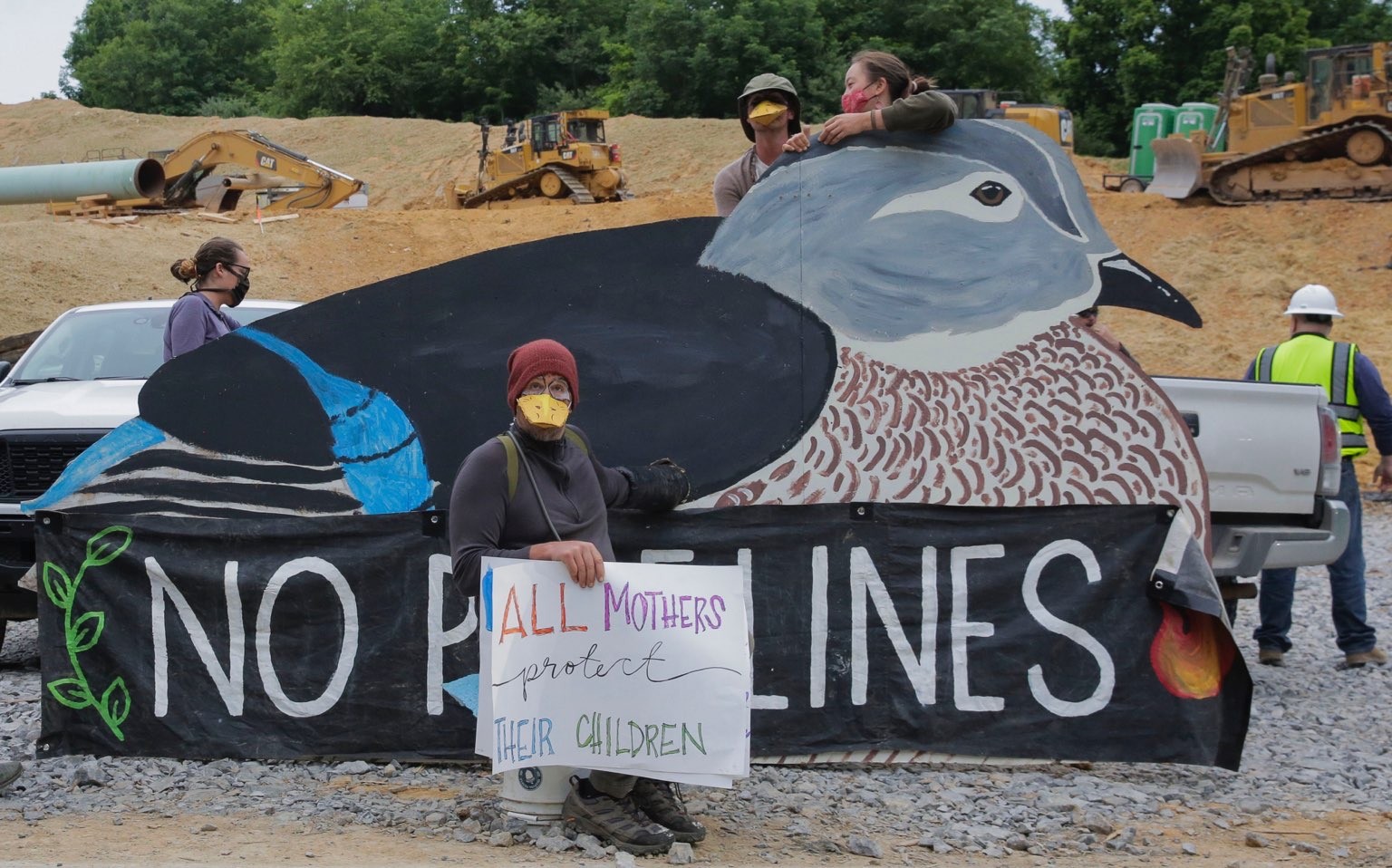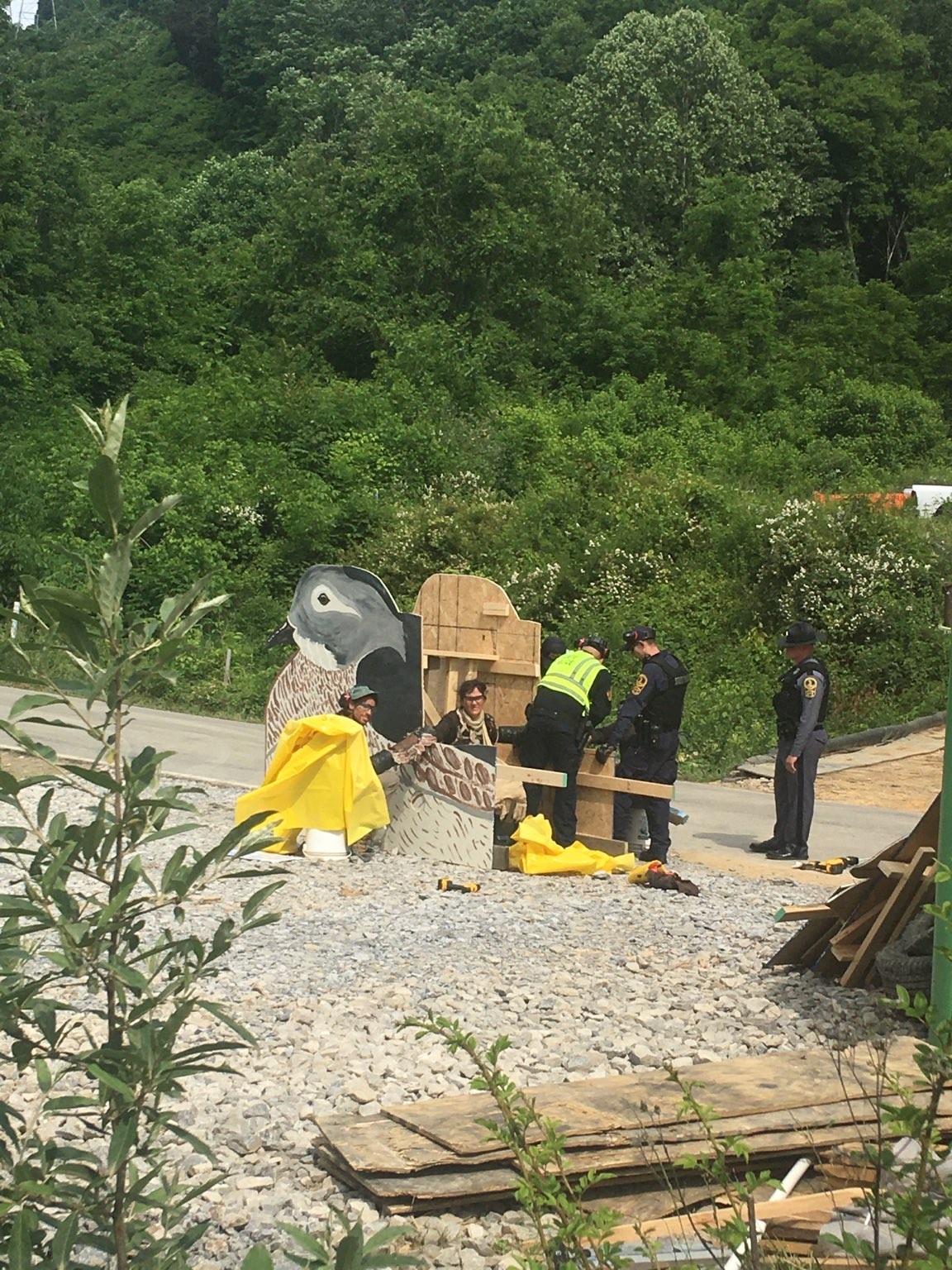Filed under: Action, Development, Environment, Land, Southeast

Action report from Appalachians Against Pipelines about recent blockade against Mountain Valley Pipeline construction.
On Wednesday, June 3, 2021 at 5:45 A.M., Mountain Valley Pipeline protesters Valerie Hahn, Ethan Hughes, and Dylan Bremmer dressed as ducks and locked themselves to a 12’ by 8’ wooden Wood Duck blocking access to a Mountain Valley Pipeline easement and equipment yard in Giles County. An additional protester sat on top of the duck. Nearby, about a dozen people gathered to support the Wood Duck protesters at the scene. Banners at the rally read, “No Pipelines,” “All Mothers Protect Their Children,” “Mama Duck Says ‘Water Is Everything’,” and “No MVP.”
Hahn, a farmer and pagan minister from New York, traveled to Giles County for the protest with her 14-year-old daughter. “I am here with my daughter so that she knows there are regular people who care enough about her future that they will try to stop this senseless construction—construction that citizens don’t want, the owners themselves can’t pay for, and that even investors know no longer makes sense,” she said.
The Mountain Valley Pipeline is a 42-inch diameter, 300-plus mile, fracked gas pipeline that runs from northern West Virginia to southern Virginia, with a 70-mile extension into North Carolina. If completed, the MVP would be responsible for nearly 90 million metric tons of annual greenhouse gas emissions, equivalent to the emissions of 19 million passenger vehicles or 23 average U.S. coal plants annually (source: Oil Change International). It contributes to climate change, increased demand for natural gas (and as a result, fracking) and is entrenched in corrupt political processes.
The failing pipeline is 3.5 years behind schedule, several billion dollars over budget and still missing hundreds of permits for wetland and stream crossings. With the extent of public disapproval and the setbacks in the project, many see the project’s failure as inevitable.

“It is time—well past time!—for the message to spread that the construction of new, extensive, harmful fossil fuel infrastructure must be stopped,” Hahn stated. “We can’t count on our politicians to stop it, or our business leaders, Federal Energy Regulatory Commission (FERC), law enforcement, local governments or any other official body. My action today is about speaking a necessary truth, that the construction of the Mountain Valley Pipeline threatens the well-being of just about every living thing on our one, shared planet.”
Local Giles County residents are concerned about the threat the pipeline poses to springs and wells that farms in the area rely on for drinking and livelihood purposes. Blasting through the fragile limestone destroys the natural water filtration system and introduces mud into streams. Muddy streams further put at risk fish like the Roanoke Logperch, already an endangered species. A pipeline inserted into this topography with high pressure gas flowing through it carries a high risk for limestone collapse, leaks and explosions. One leak could quickly contaminate water throughout Sinking Creek Valley, where this action took place. Recently, residents submitted public comments to the Army Corps of Engineers requesting that the Army Corps grant VA DEQ’s request for a full year to review the water crossing permit applications, and that the Army Corps deny MVP’s request for a 404 permit related to crossing water bodies.
Local resident Alan Moore is thrilled with the fresh energy that Hahn, Hughes, and Bremmer have brought to the more than 6 years of local pipeline resistance. “Most locals are against the pipeline, but many of us who have fought for years are worn out,” they said. “We looked to our leaders but they betrayed us. At times we’ve felt voiceless and alone. When we listen to and empower new voices, we build community and strength.”
For Hughes, a 48 year-old former marine biologist and father of two young children, the Wood Duck placed in the path of the pipeline represents the loss of three billion birds globally since 1979 due to habitat destruction and contamination of their ecosystems. “Some areas that the MVP passes through are protected areas for birds. All living beings on this planet have a right to live and thrive. How low must the bird population drop before we say, ‘Enough!’?” Hughes said. “This is a pivotal moment for all of us. It is all of our responsibility to do all that we can to protect what we love. Yes, it takes sacrifice, but it is meaningful to know that I am giving up something of lesser value for something of greater value.”

Bremmer, an abolitionist from Atlanta, said, “We are nature protecting itself. We don’t know what a post-fossil fuel world will look like but clutching onto doomed pipeline projects won’t help any. With guidance from indigenous leadership who have been fighting extractivism for centuries, along with curiosity and compassion, we will find a way. We’re all in this together.”
At around 12:30 P.M., after nearly 7 hours blockading pipeline construction, Hahn, Hughes and Bremmer were extracted from the Wood Duck and arrested. They were given $1000 and $2000 bail and are currently at New River Valley Regional Jail.
The fourth protester, who was arrested after sitting on top of the Wood Duck, was charged with two misdemeanors (interfering with property rights and trespassing) and released on PR (personal recognizance) around 10:00 A.M.
Today’s protest on the unfinished stretch of pipeline in Giles County is not unique. Hahn, Hughes, Bremmer and the fourth anonymous protester follow in the footsteps of strong Appalachian resistance to MVP and are among thousands of people organizing to express their opposition to new fossil fuel extraction projects globally. The story of MVP and the resistance to it reflects global efforts to address the urgency of the climate crisis and to protect the ecosystems and water on which all life depends.





